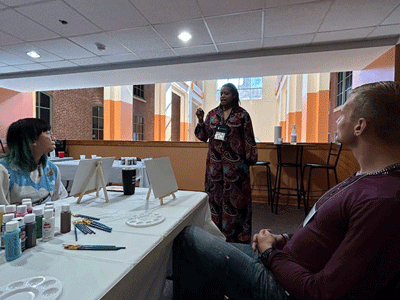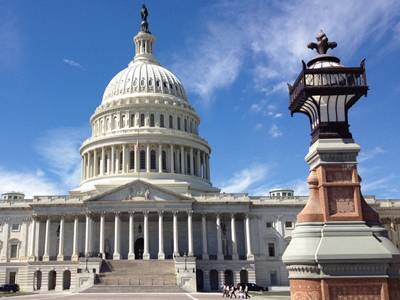The PC(USA) holds itself accountable to its commitments to actively work against sexism and for gender justice through the work of the Advocacy Committee for Women and Gender Justice (ACWGJ). ACWGJ serves as a prophetic gender justice advocacy and monitoring body to and for the PC(USA).
The committee’s three primary responsibilities include:
1. Serving as a voice of advocacy on existing and emerging issues of gender justice both within the church and society;
2. Evaluating and monitoring policies, procedures, programs and resources regarding the way in which they impact the status and position of women; and
3. Giving the General Assembly and the Presbyterian Mission Agency advice and counsel via overtures, resolutions, and reports recommending policy direction or action on justice issues.
The committee carries out these advocacy and monitoring functions in collaboration with the LGBTQIA+ Equity Advocacy Committee (ACQ+E), the Racial Equity Advocacy Committee (REAC), and the Advisory Committee on Social Witness Policy (ACSWP).
ACWGJ invites liaisons from other entities of the Presbyterian Church (U.S.A.) to sit with the committee at its regularly scheduled meetings.
We do this recognizing the complex ways in which gender inequality manifests itself differently because of class, race, ethnicity, education, age, status in employment, disability, sexual orientation, gender identity, marital status and culture.
LGBTQIA+ Equity Advocacy Committee (ACQ+E)
ACQ+E advocates for and elevates the voices of the LGBTQIA+ community.
Racial Equity Advocacy Committee (REAC)
REAC advocates for people of color by monitoring existing and emerging issues in the church and society.
Advisory Committee on Social Witness Policy (ACSWP)
ACSWP develops, interprets and monitors policies that encourage and challenge the church and society to reflect and act in faithful response to God’s call to do justice.
General Assembly Nominating Committee (GANC)
GANC proposes nomination for election for persons to serve on General Assembly level entities.
National Association of Presbyterian Clergywomen (NAPC)
NAPC works with clergywomen on a national and regional level to be a supportive community and advocate for justice within the Presbyterian Church (U.S.A.).
National Network of Presbyterian College Women (NNPCW)
NNPCW nurtures young women’s spiritual development through study, discussion, prayer and action.
Presbyterian Women (PW)
PW, the national women’s organization of the Presbyterian Church (U.S.A.), is committed to nurturing faith, supporting the church’s mission, working for justice and building community.
Presbyterian Ministry at the United Nations
Our office at the U.N. keeps the church up to date on the issues before the world and brings the voice of the church to the work of the United Nations.
Racial Ethnic Young Women Together (REYWT)
REYWT is a nationally structured network of racial ethnic young women whose leadership reflects the diversity of today’s church and who will develop and provide resources that support our goal of becoming a vital and recognizable constituency of the Presbyterian Church (U.S.A.).
In turn, liaisons from the ACWGJ attend the meetings of the following entities.
Racial Equity Advocacy Committee (REAC)
Advisory Committee on Social Witness Policy (ACSWP)
Board of Pensions (BOP)
BOP provides pension, medical, death, disability and optional benefits for participating church workers.
Committee on Mission Responsibility Through Investments (MRTI)
MRTI implements the General Assembly’s policies on socially responsible investing by engaging corporations in which the church owns stock.
Call to Stand with Transgender, Nonbinary, and LGBTQIA+ Youth and Their Families
Women’s Health Protection Act of 2021
A Voting Rights Call to Action
Statement Against Gender Based Violence and Femicide in Puerto Rico
Advocacy Committees Respond to PMA Governance Task Force Proposal
Read the letter
ACWC Statement on Abortion
Read the statement
ACWC Calls for Advocacy on Behalf of Trans Siblings
Read the letter
The Advocacy Committee for Women’s Concerns recognizes that the binaries of “men” and “women” do not fully reflect the gender identities of all God’s people. The Presbyterian Church (U.S.A.) has declared in the Book of Order that, “there is no place in the life of the Church for discrimination against any person.” Our advocacy for women includes all those who identify as women and those whose lives are affected by discrimination connected to their gender. The transgender community is one such community.
While transgender persons have been in the media lately due to Caitlyn Jenner and Raffi Freedman-Gurspan, the murder of transgender women, particularly transgender women of color, has mostly been met with silence. While we know of eighteen murders of trans-women so far this year, we also recognize that many murders of transwomen may not be documented as such. In several instances, those closest to these women were left with no answers for long periods of time because the reports misgendered the victims by not using the pronouns and names that they identified with and were known by.
The Advocacy Committee for Women’s Concerns stands with those who grieve these lost lives and seeks justice for the hate crimes committed against these persons. We also implore the media and police to accurately and faithfully report the violence against trans-persons, so that we can respond and better support the trans-community. Further, we challenge the Presbyterian Church (U.S.A.) to be vocal on behalf of those experiencing gender-based discrimination to the point of forcing them to live in fear for their very lives. The 221st General Assembly (2014) spoke boldly to the denomination on the global crisis faced by lesbian, gay, bisexual and transgender people, encouraging prayer, the creation of resources for study and action, and the provision of sanctuary, safety, and support. For transgender people, that global crisis of hatred is very real here in the United States as well as around the world.
We decry violence of any kind but are particularly troubled when women are specifically targeted for their gender identity and when women of color are disproportionately represented in those who are victim of this type of violence. 1 John 4 proclaims that “God is love, and those who abide in love abide in God, and God abides in them,” (vs 16) and that, “There is no fear in love, but perfect love casts out fear” (vs 18). At the root of our violence is fear. Transphobia is a sin. We confess our sins and the sins of our culture. We hope and commit to work for a day when no person may be the victim of hate and violence. We invite the PC(USA) to commit with us.
ACWC Responds to Attacks on Planned Parenthood
The Advocacy Committee for Women’s Concerns (ACWC) of the Presbyterian Church (USA) is committed to maintaining a prophetic voice on behalf of women. As people of faith, committed to justice, we are troubled by the recent attacks and harassment of Planned Parenthood and the continued assaults on the reproductive wellbeing and healthcare for women. Jesus said, “Truly I tell you, just as you did it to one of the least of these who are members of my family, you did it to me” (Matthew 25:40). Jesus implores us to care for the marginalized and oppressed.
We believe that all women have a right to quality and affordable health care. Planned Parenthood’s health centers have consistently provided quality, affordable health care in a safe and caring environment. Close to 3 million women receive healthcare from Planned Parenthood each year. Among the critical women’s and family health that they provide annually include: preventive healthcare, birth control, 500,000 potential life-saving mammograms, and 400,000 pap smears. In fact, one in five women turns to Planned Parenthood at some time in her life for professional, non-judgmental, and confidential care.
Although only three percent of Planned Parenthood’s healthcare services include abortions, consistent with the policy of the Presbyterian Church (USA), ACWC believes that the decision for a woman to terminate an unwanted or unhealthy pregnancy is an issue that is deeply layered and complex. Women, with their healthcare providers, are the only persons informed and equipped to make the best decisions about their bodies, their health and wellbeing, as well as that of their family’s.
ACWC stands with women who have a right to women’s healthcare services and we stand with Planned Parenthood as a vital provider of those services.
For more on the specifics of PC(USA) policy, see When You Need Wisdom, Problem Pregnancy Resource produced by the Office of Gender and Racial Justice, Racial Ethnic and Women’s Ministries/Presbyterian Women, 2010. (pp. 7-10).
There are currently 12 members of the committee, 12 that are nominated by the General Assembly Nominating committee and are elected by the General Assembly and five liaison members from various partners in ministry.”
- two clergywomen
- one female lay employee of the church
- vice moderator for Justice and Peace of Presbyterian Women’s Churchwide Coordinating Team
- one member of the General Assembly Mission Council Executive Committee
- seven members-at-large, chosen to balance the committee geographically, racially and ethnically, and with persons of diverse ages and varied expertise.
In addition, at least four of the members shall be racial ethnic women, and at least two, not more than three, will be men. Members may serve up to two four-year terms.
Members
Raquel Ramirez Torres, Co-Chair
Courtney Steininger, Co-Chair and Liaison to GACOR
Madison McKinney, Co-Chair and Dual Member on PMAB
JoAnne Sharp, Dual Member on A Corp
Victoria Alexander, Liaison to ACSWP
Cecelia Armstrong
Hailey Malcolm
Rev. Le Anne Clausen de Montes, Liaison to REAC
Kathleen Keefer, PW Vice Moderator
Joshua Marmol
Kamal Hassan
Rev. Kerri Allen, Adjunct Member with MRTI

ACWGJ uses its regularly scheduled meetings to explore a wide range of topics of special interest to the committee and its work.





